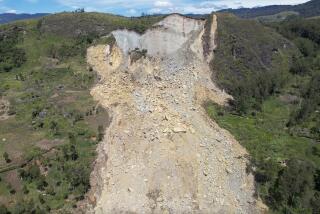Full Refugee Camps Brace for Even More
- Share via
LOJANE, Macedonia — U.N. refugee officials here faced a crisis of overcrowding Tuesday, with their camps filled beyond capacity and a reported 10,000 more Kosovo refugees trying to get into Macedonia.
Macedonian officials were reluctant to let the refugees in without more space in the camps, stranding at least 2,000 refugees on a road just outside the border with Yugoslavia’s Kosovo province for nearly 24 hours with neither food nor shelter. However, by late Tuesday, the Macedonians said those refugees were being accepted into the country.
As many as 8,000 more refugees were arriving in or heading for the tiny mountain village of Maline, where more than 3,500 refugees already have overwhelmed the 400 Macedonian inhabitants, according to reports by local villagers to the United Nations.
Facing a potential disaster, U.N. officials had few answers. Construction began Tuesday on a new camp that promised some relief, but, at most, space for 5,000 more refugees will be ready by week’s end.
“We’re basically between a rock and hard place,” said Ron Redmond, a spokesman for the Office of the U.N. High Commissioner for Refugees. Redmond said the U.N. had asked for other sites to build new camps but had been turned down by the Macedonian government.
Macedonian officials said they were trying to help, but noted that the country has been overwhelmed by 127,000 refugees so far, an amount equal to more than 6% of the country’s population. It is comparable to the U.S. population suddenly growing by about 16 million.
Stevo Pendarovski, head of research for Macedonia’s Interior Ministry, said the government hoped to resolve the crisis. “It’s an enormous amount for us,” he said. “We are a poor country.”
The latest refugee crisis was clearly visible Tuesday from the top of a pine-covered hill overlooking the border with Yugoslavia near this Macedonian village.
Packed on a short stretch of road between rows of trees, about 1,500 to 2,500 Kosovo refugees hunkered under umbrellas and tattered plastic sheets in rain and cold, waiting to be let into Macedonia. A single guard at a machine-gun emplacement stood before them.
Villagers and U.N. officials said refugees began arriving at the border here about 10 p.m. Monday. They said Macedonian officials refused to let them cross the border until more space became available in the camps.
Tuesday morning, U.N. trucks came to deliver food and blankets but were not allowed access to the refugees by Macedonian police.
Vaxhid Iljazi, a village leader, said residents offered to provide housing for the people. “We are irritated and frustrated,” Iljazi said. “This is unnecessary.”
Pendarovski, the Interior Ministry official, blamed the U.N. for the delay, saying it had not provided transportation for refugees. U.N. officials insisted that they had.
By late Tuesday, the dispute was apparently resolved. Pendarovski said many of the people stuck at Lojane would be transported to camps during the evening.
A potentially more serious problem lay high in the Black Mountains above Skopje, Macedonia’s capital. An additional 2,000 to 3,000 refugees reportedly streamed into Maline on Monday night, following the more than 3,500 who crossed the border illegally over the weekend.
Though U.N. officials had not confirmed the numbers, they say the new refugees reported that an additional 4,000 to 5,000 people were on the way, possibly putting more than 10,000 refugees into the tiny town.
U.N. officials were struggling with how to handle the influx. Maline is only 15 miles north of the capital, but it can take as many as three hours to reach the village on a road that is a single, muddy lane in parts. Relief workers were debating whether it would be better for the refugees to leave the village, further straining overcrowded camps, or for the U.N. to supply the village with food and water carried by daily convoys.
Redmond said it wasn’t clear where the new refugees would go. Refugee officials said camp populations already are three times what they should be, increasing the dangers of public health risks and unrest.
Relief is on the way, though it will take time. Construction of a new camp, in the town of Cegrane, began Tuesday. If completed three weeks from now, as planned, it will be able to hold 15,000 to 20,000 people.
*
Many charities are accepting contributions to help refugees from Kosovo. The list may be found at https://www.latimes.com/kosovoaid.
More to Read
Sign up for Essential California
The most important California stories and recommendations in your inbox every morning.
You may occasionally receive promotional content from the Los Angeles Times.













